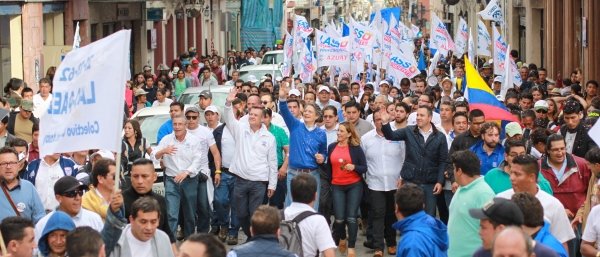Still to Come This Week
 |
Monday, April 19 // 4–5:30 p.m. (ET)
The half-century before the Civil War was beset with conflict over equality as well as freedom. Kate Masur’s book illuminates a multi-decade struggle to rid the free states of racist laws and push the principle of racial equality onto the federal agenda.

Tuesday, April 20 // 10–11 a.m. (ET)
Join us for a conversation during the Smithsonian's Earth Optimism Week with European and American experts about the prospects of a hydrogen-powered economy, areas of transatlantic collaboration, and the latest innovations in the hydrogen sector.

Wednesday, April 21 // 10–11:30 a.m. (ET)
This roundtable will feature experts representing a variety of think tanks who have recently issued reports on U.S. Middle East strategy.

Wednesday, April 21 // 10–11 a.m. (ET)
Join us for a conversation with European and American representatives of offshore wind projects about the potential for the use of offshore winds on both sides of the Atlantic, the role it has in the fight against climate change, and new innovations that are driving implementation.

Wednesday, April 21 // 12:30–1:30 p.m. (ET)
Serhii Plokhii’s new book, Nuclear Folly: A History of the Cuban Missile Crisis, offers an international perspective on the crisis, tracing the tortuous decision-making that produced and then resolved it.

Thursday, April 22 // 10–11 a.m. (ET)
Nandan Unnikrishnan, Distinguished Fellow at the Observer Research Foundation, will join the Wilson Center’s Kennan Institute and Asia Program for a conversation on the current status and future trajectory of India-Russia relations.

Thursday, April 22 // 1–2:30 p.m. (ET)
As Iceland’s Chairmanship of the Arctic Council comes to a close, we will look back on the progress made in the past two years during the Icelandic Chairmanship to advance Arctic sustainability and science collaboration, and we will look forward to what’s next for the Arctic Council as we continue to see the region transform due to a rapidly changing climate.

Thursday, April 22 // 3:30–5 p.m. (ET)
With nearly 30,000 boots on the ground in Korea, Canada fought in several key battles and engagements, provided naval and aerial support to the UN, and suffered hundreds of combat causalities. Although often overlooked or forgotten, the Korean War is a key chapter in the U.S.-Canada relationship, in Canada’s modern military history, and in the record of Canada’s engagement with multilateral and collective security institutions.

|





